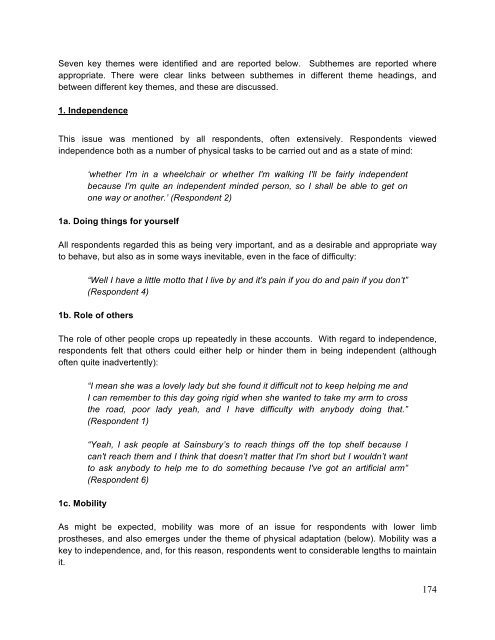Download the report - The Healing Foundation
Download the report - The Healing Foundation
Download the report - The Healing Foundation
You also want an ePaper? Increase the reach of your titles
YUMPU automatically turns print PDFs into web optimized ePapers that Google loves.
Seven key <strong>the</strong>mes were identified and are <strong>report</strong>ed below. Sub<strong>the</strong>mes are <strong>report</strong>ed where<br />
appropriate. <strong>The</strong>re were clear links between sub<strong>the</strong>mes in different <strong>the</strong>me headings, and<br />
between different key <strong>the</strong>mes, and <strong>the</strong>se are discussed.<br />
1. Independence<br />
This issue was mentioned by all respondents, often extensively. Respondents viewed<br />
independence both as a number of physical tasks to be carried out and as a state of mind:<br />
‘whe<strong>the</strong>r I'm in a wheelchair or whe<strong>the</strong>r I'm walking I'll be fairly independent<br />
because I'm quite an independent minded person, so I shall be able to get on<br />
one way or ano<strong>the</strong>r.’ (Respondent 2)<br />
1a. Doing things for yourself<br />
All respondents regarded this as being very important, and as a desirable and appropriate way<br />
to behave, but also as in some ways inevitable, even in <strong>the</strong> face of difficulty:<br />
“Well I have a little motto that I live by and it's pain if you do and pain if you don’t”<br />
(Respondent 4)<br />
1b. Role of o<strong>the</strong>rs<br />
<strong>The</strong> role of o<strong>the</strong>r people crops up repeatedly in <strong>the</strong>se accounts. With regard to independence,<br />
respondents felt that o<strong>the</strong>rs could ei<strong>the</strong>r help or hinder <strong>the</strong>m in being independent (although<br />
often quite inadvertently):<br />
1c. Mobility<br />
“I mean she was a lovely lady but she found it difficult not to keep helping me and<br />
I can remember to this day going rigid when she wanted to take my arm to cross<br />
<strong>the</strong> road, poor lady yeah, and I have difficulty with anybody doing that.”<br />
(Respondent 1)<br />
“Yeah, I ask people at Sainsbury’s to reach things off <strong>the</strong> top shelf because I<br />
can't reach <strong>the</strong>m and I think that doesn’t matter that I'm short but I wouldn’t want<br />
to ask anybody to help me to do something because I've got an artificial arm”<br />
(Respondent 6)<br />
As might be expected, mobility was more of an issue for respondents with lower limb<br />
pros<strong>the</strong>ses, and also emerges under <strong>the</strong> <strong>the</strong>me of physical adaptation (below). Mobility was a<br />
key to independence, and, for this reason, respondents went to considerable lengths to maintain<br />
it.<br />
174


